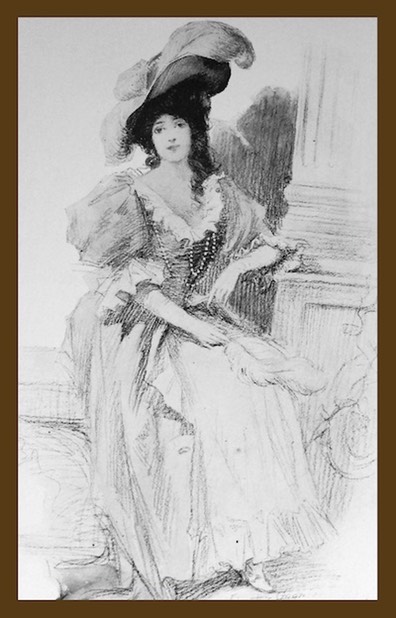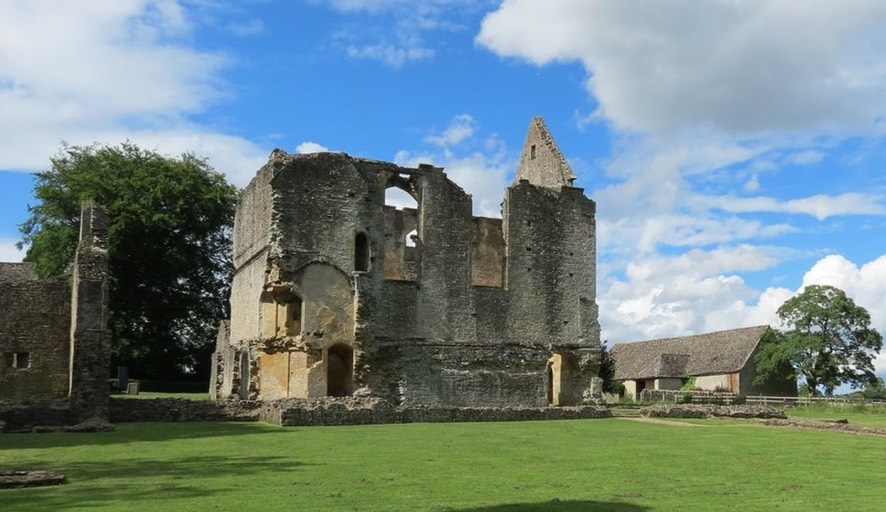As you might have suspected, I finally found a copy of “Crest of the Little Wolf: A Story of the Young Lovell and the Wars of the Roses” that didn’t break the bank (It goes for about $130 at AbeBooks). After faithfully reading a dozen pages, I can report that no one will be bringing out a paperback edition in the near future, and that it probably holds a low priority for being digitized and offered online at Openlibrary.
Among the most trusted friends of the House of York was the hero of our story, Francis Lovell, Lord of Minster Lovell and of the baronies of Holland, Tichmersh, Rotherfield and D’Eyncourt, and possessor of the great Manors of Holgate-Burnell and Acton-Burnell in Shropshire and Askam-Bryan in Yorkshire. ‘The Young Lovell,’ as he is perhaps better known through the plays of Shakespeare, in history and in the romances of that stirring period, was the son of Lord John Lovell, a staunch Lancastrian noble of much influence at the court of Henry VI, who, owing to the signal services rendered by his son to the Yorkist side, was on their triumph permitted to retire to his estates, where he died in the fourth year of Edward’s reign.
Not that it’s wretched. The language is often deliberately archaic, as if trying to channel Sir Walter Scott, but while Rhodes does manage to set the stage with only a few sentences, they are often of an unwieldy length. By the time you get to the end of one, you might have forgotten how it was launched, and why you stepped on board in the first place. Then there’s the overripe dialogue, such as the flirtatious banter that ensues when Lord Lovell manages to separate his beloved Anne Fitz Hugh from other members of the retinue surrounding the queen.
'Lady, I have led thee apart from yonder butterflies that I might if thou wilt graciously permit, have private speech with thee.'
'Nay, my Lord,’ returned the maiden with a startled glance and blush, ‘that were scarce seemly, and I pray you if there be aught to say that I may hear, let thy tongue speed swiftly, and subject not mine absence to the stinging comments of those same butterflies.'

Readers who are still with Thomas Daniel Rhodes at this point will probably pull off the road for a nap a few pages later when they find themselves up to their eyeballs in “forsooths.” Anyway, it’s a handsome little volume with a pair of delicate illustrations protected by onionskin overleaf, and it does present its romantic fiction within a thoroughly-researched framework of family lore. I’m particularly grateful for it, because it led me to another romance about Lovell, one from a well-known author, masterfully written and full of strange surprises.
Anyone who watched Benedict Cumberbatch on PBS in last year's “Parade’s End” has already made the acquaintance of English novelist and poet Ford Maddox Ford. Ford's “Young Lovell: A Romance,” written in 1913, seems at first to be a hallucinatory evocation of a heroic age, bristling with references to witches, warlocks, elves, ancient gods and goddesses, Helen of Troy, and the search for the philosopher’s stone.
In the darkness Young Lovell of the Castle rose from his knees, and so he broke his vow. Since he had knelt from midnight, and it was now the sixth hour of the day, he staggered ; innumerable echoes brushed through the blackness of the chapel; the blood made flames in his eyes and roared in his ears. It should have been the dawn, or at least the false dawn, he thought, long since. But he knew that, in that stone place, like a coffer, with the ancient arched windows set in walls a man's length deep, it would be infinitely long before the light came to his eyes. Yet he had vowed to keep his vigil, kneeling till the dawn . . .
These opening lines of “The Young Lovell” introduce readers to the last member of the Lovell family to occupy Minster Lovell, on the eve of his knighthood. If some of what follows that first paragraph seems to presage J. R. R. Tolkien or J. K. Rowling, it may be only because the same rich cultural past shaped all three writers. There’s no school for young wizards in Ford Madox Ford’s book, although Young Lovell does ride out of Castle Lovell on a roan stallion named Hamewarts. He immediately meets a shape-shifting witch who puts a curse on him, and next spies a pixie-like figure he recognizes as Master Stone, a shriveled, other-worldly lawyer who speaks with the fawning patter of a house elf. How much of this is happening in what we would call the real world of 1486, and how much owes to Young Lovell’s fevered imagination, is a matter left for readers to ponder.

It’s not all knights in shining armor and fantastical menageries. Besides providing a rich bit of family history, the book is a who’s-who of late 15th century Northumberland aristocracy, how they all made it to the top, what they think of each other, and which lands they hope to acquire next. All of it is rendered in layers of intricate, authentic-sounding detail. Even when the Young Lovell faces Satan himself, "the master fiend, with legs of scarlet, a bull's hide sweeping behind and horns all gold and aquamarine, had been dancing with mighty leaps above a coal fire, up through which, livid and in flaming shrouds, there had risen the poor souls of folk in purgatory,” we have to nod in acknowledgement. Yup. That’s probably what Satan looks like, and just the sort of thing he would do.
Ford's romance can be as difficult to get through as the one written by T. D. Rhodes, but for different reasons. Wading past 300 pages riddled with obscures Medieval terms and scintillating but densely-packed imagery, may leave the reader feeling like a marathon runner who doesn’t quite have the wind to cross the finish line. However, get as far as a quarter of the way in, and you’ll feel like an eyewitness to the late 1400’s. Even a sample can be a rewarding read, and it’s a free download from the Internet to boot.
Photo of Minster Lovell courtesy Rick Berckefeldt